Post
A catch
Save a catch to start your fishing logbook. You will be able to to share it with the community if yo want!
A fishing trip
Post an ad to go fishing with other fishermen
Save a catch to start your fishing logbook. You will be able to to share it with the community if yo want!
Post an ad to go fishing with other fishermen
Share a thought, a question with the community
My favorite cities
×Keep your rods ready for Jeddo in St. Clair. The fishing forecast is currently 2.5. The most caught fishes here are the moapa dace, the atlantic salmon, the american shad and the brook trout. Come try the most famous fishing techniques like the support fishing for bass, trolling, how to catch smelt with square net? or surfcasting.
Our fishing forecast of Jeddo indicates the best time to go fishing in this city.
The Moapa Dace
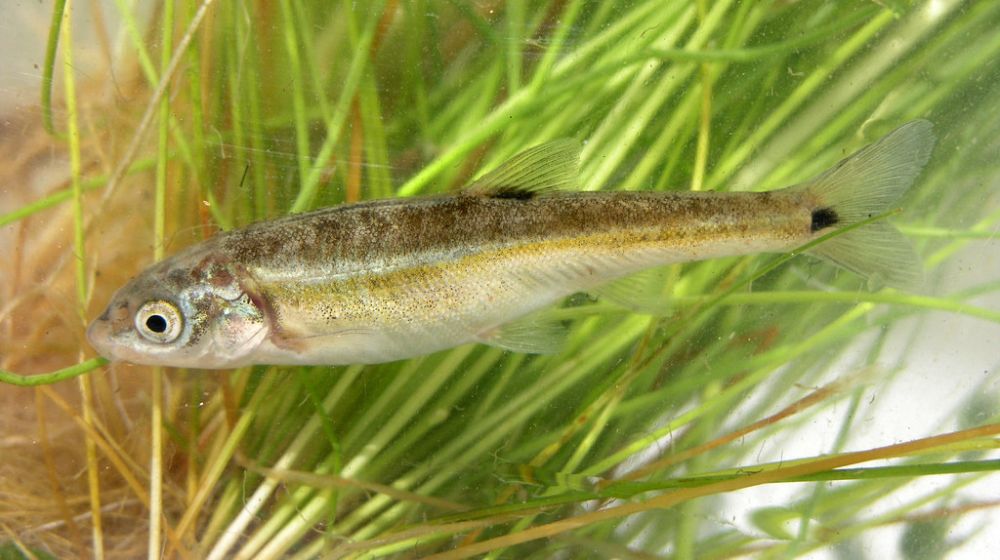
The Moapa Dace belongs to the Cyprinidae family. It has an average size of 10 to 13 cm. It has a lifespan of 4 years old. It may spawn throughout the year with a maximum activity in spring. It is an endangered species so the fishing is prohibited. It is a small fish with a short head, a terminal mouth and thick, semiconducting lips. The dorsal fin begins above or slightly behind the insertion of the pelvic fins and the caudal fin is forked. The dorsal color is dark, the sides are brownish with slightly golden areas and the ventral color is light. There is a dark spot on the tail and a dark line on each side of the body. The scales are small and deeply inlaid and the skin looks like leather. Some dace species have a small maxillary barbell, but not the species.
The Moapa Dace is a famous fish you can catch in Jeddo.The Atlantic salmon
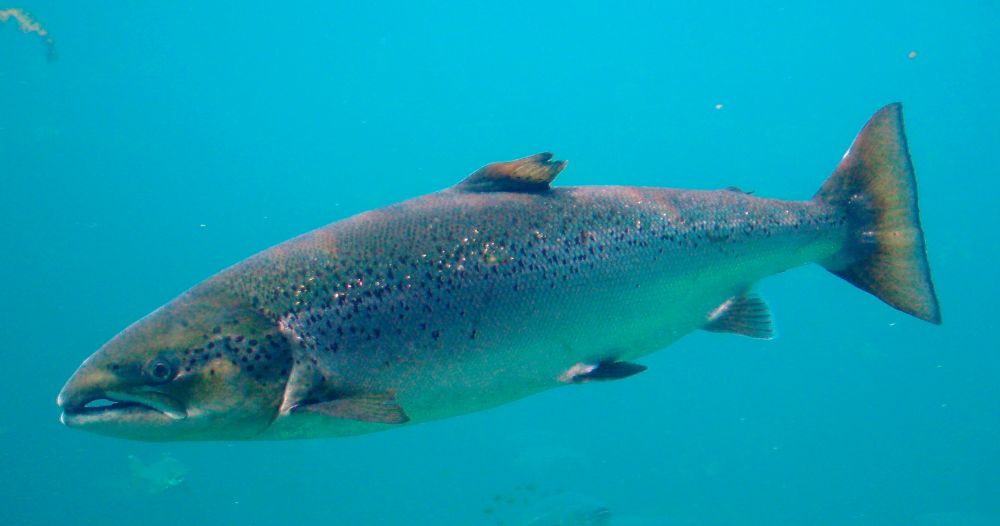
The Atlantic salmon belongs to the Salmonidae family. Atlantic salmon can measure up to 1.50 m in length and weigh up to 36 kg. The average longevity of Atlantic salmon is estimated at 10 years. It breeds from October to November. The female lays 1500 to 1800 eggs per kg of weight. It can be fished all year round. Atlantic salmon have an elongated and slender body. The anal fin has eight to eleven rays. The caudal is large, concave in adults and forked in young people. The head is small and flattened on top. The mouth is large (split to the posterior edge of the eye) and has strong teeth on the jaws, tongue and palate. The scales are large and visible. The lateral line is straight. Large black dots on a light background form X on the head, back and dorsal fin. The color varies from blue to blue-grey on the back, it is silvery on the sides. It varies during the spawning season, with adults turning bronze to dark brown. They lose their silvery livery when they enter fresh water. Males are marked with red dots on the sides. The young are marked with seven to eleven vertical fingerprints that they will lose when they enter the sea. As spawning approaches, the male's head will change: it will elongate, the lower jaw will develop and bend to form a hook (male "becard").
The Atlantic salmon is a famous fish you can catch in Jeddo.The American Shad
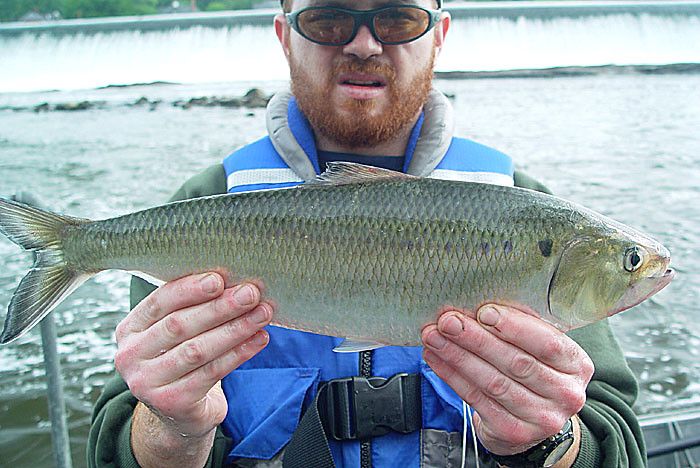
The American Shad belongs to the Clupeidae family. With an average of 38 cm, adult specimens can measure up to 76 cm and weigh between 0.9 and 1.4 kg. It can live up to 13 years old. Egg laying takes place in May, June or July. On average, the female lays 140,000 eggs, but can reach 600,000 eggs. It is fished in the spring. The American shad is characterized by its slender, high and very flattened body. The species has a very forked caudal fin and a low, elongated anal fin. It has no lateral line or adipose fin. Its color is silvery with a blue or blue-green sheen on the back and bright silver flanks. When entering fresh water for reproduction, the pigmentation may become darker, taking on a tan or copper hue, turning red for the head and belly parts. A black spot is visible near the top edge of the lid, sometimes followed by smaller spots. Its lower jaw fits into a notch in its upper jaw. It can also be recognized by its large scales that are easily detached. The ventral surface of the American shad is thin with saw tooth scales. With regard to internal characteristics, it has teeth in the premaxillary and lower jaw, a silver peritoneum and, between 53 and 59 vertebrae.
The American Shad is a famous fish you can catch in Jeddo.The Brook Trout
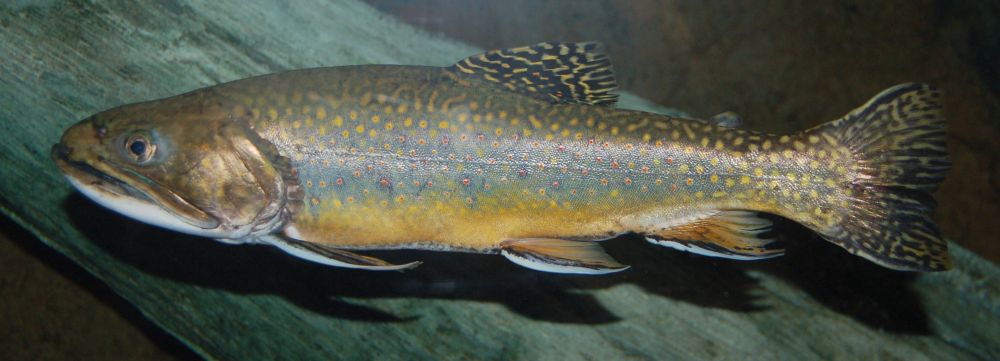
The Brook Trout belongs to the Salmonidae family. The average size of the brook trout is 50 cm and the weight only exceptionally exceeds 7 kg. It has a longevity of 5 years. It reproduces in autumn. It is fished from April to September. Its body is fusiform, laterally compressed, and slender. Its general shape is reminiscent of trout, although a little more massive. The body is arched at the dorsal fin. It has a small but stocky head with a widely split mouth, including teeth on the jaws, tongue and palate. On the body, the scales are small and thin. The Brook trout have two dorsal fins, one of which is characteristic of Salmonids. The color is distributed differently over the body: the back is rather dark brown, with lighter mottling and covered with a network of very close yellow spots. The sides have a beautiful light brown color, sometimes olive green. They also have yellow spots, less tightened. Round and red spots can also be seen on the sides. The color of the belly varies from white to pink, but can be pale yellow to dark red. It all depends on the environment in which it operates. Populations living near the bottom are paler than those living in open water, rather colorful. In males, the livery becomes bright orange during the breeding season. Finally, the pectoral, pelvic and anal fins are bordered by a white border, specific to the genus Salvelinus, highlighted here by a black band.
The Brook Trout is a famous fish you can catch in Jeddo.The Bull trout
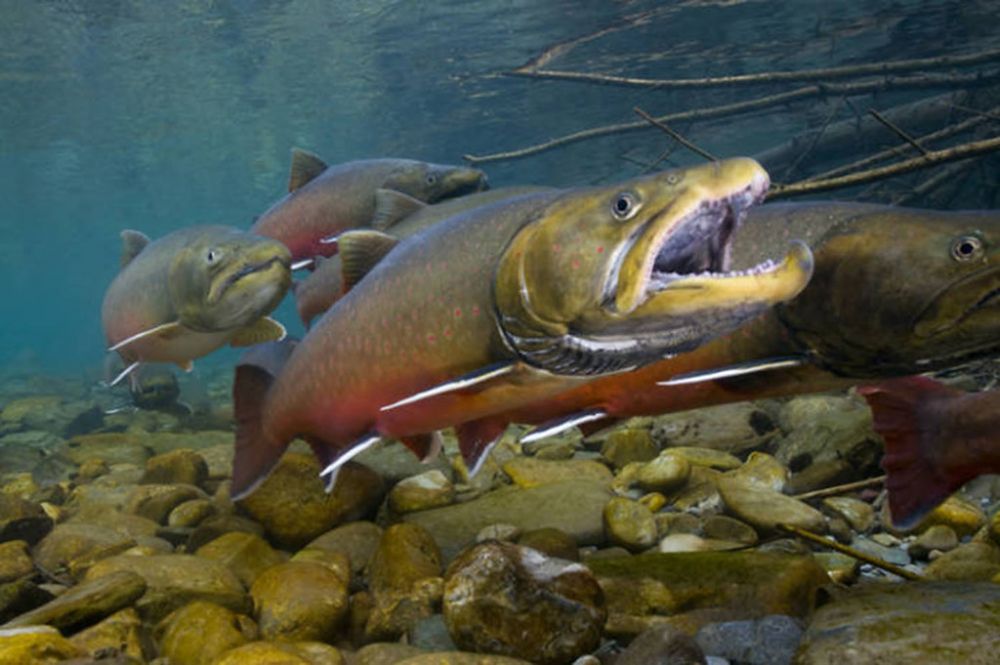
The Bull trout belongs to the Salmonidae family. It can measure up to 103 cm long and weigh up to 14.5 kg. It can live for a dozen years. It breeds from July to December. It can be fished from June to February. Like other arctic char species, the fins of a bull trout have white leading edges. Its head and mouth are exceptionally large for salmonidae, which gave it its name. Bull trout up to 103 cm long and weighing 14.5 kg have been recorded. Bull trout can be migratory, moving through major river systems, lakes and the ocean, or they can be resident and remain in the same river all their lives. Migratory bull trout is generally much larger than resident bull trout, which rarely exceeds 2 kg. Bull trout differs from brook trout (S. fontinalis) in the absence of distinct spots on the dorsal fin, as well as yellow, orange or salmon spots on the back, as opposed to red spots with blue halos on the trout stream. Bull trout do not have the deep-dug caudal fin of lake trout (S. namaycush, another Arctic char).
The Bull trout is a famous fish you can catch in Jeddo.Our fishing forecast of Jeddo indicates the best time to go fishing in this city.
Our fishing forecast of Jeddo indicates the best time to go fishing in this city.
Our fishing forecast of Jeddo indicates the best time to go fishing in this city.
